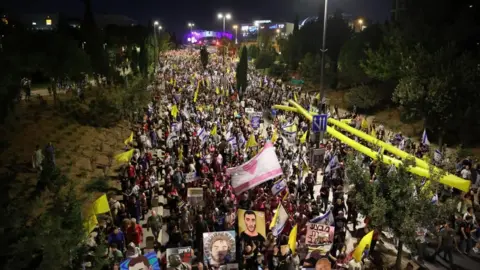Kidnappers in Nigeria have killed at least 35 hostages, including many young people, even after ransoms were paid for their release. This incident took place in Banga village, located in the Kauran Namoda local government area of Zamfara state. According to local officials, criminal gangs, often referred to as bandits, have increasingly turned to kidnapping as a profitable venture.
The alarming event unfolded when 56 villagers were abducted in March. Following negotiations, the kidnappers demanded a ransom of one million naira (approximately $655; £485) per individual held captive. Local government chairman Manniru Haidara Kaura revealed that only 18 individuals—17 women and one young boy—were released after the ransom was paid.
Haidera shared his grief over the brutality of the attackers, stating, "They slaughtered them like rams." He lamented the senselessness of the act, emphasizing that the assailants were destroying their own community. Currently, 16 of the survivors are receiving medical attention, while the bodies of the deceased are unlikely to be returned, as kidnappers rarely return corpses.
In 2022, Nigeria introduced a law aiming to tackle the rising kidnapping crisis, making ransom payments illegal and punishable by up to 15 years in prison, along with the death penalty for kidnappers if their victims die. Despite these legal measures, no arrests have been made under this law, and families often feel compelled to pay ransoms due to the government's inability to guarantee safety.
As the nation grapples with this ongoing crisis, many families are left heartbroken and fearful, facing difficult choices in the fight for survival amid rampant lawlessness and violence.
The alarming event unfolded when 56 villagers were abducted in March. Following negotiations, the kidnappers demanded a ransom of one million naira (approximately $655; £485) per individual held captive. Local government chairman Manniru Haidara Kaura revealed that only 18 individuals—17 women and one young boy—were released after the ransom was paid.
Haidera shared his grief over the brutality of the attackers, stating, "They slaughtered them like rams." He lamented the senselessness of the act, emphasizing that the assailants were destroying their own community. Currently, 16 of the survivors are receiving medical attention, while the bodies of the deceased are unlikely to be returned, as kidnappers rarely return corpses.
In 2022, Nigeria introduced a law aiming to tackle the rising kidnapping crisis, making ransom payments illegal and punishable by up to 15 years in prison, along with the death penalty for kidnappers if their victims die. Despite these legal measures, no arrests have been made under this law, and families often feel compelled to pay ransoms due to the government's inability to guarantee safety.
As the nation grapples with this ongoing crisis, many families are left heartbroken and fearful, facing difficult choices in the fight for survival amid rampant lawlessness and violence.





















